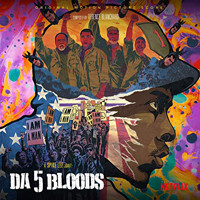- Composed by Terence Blanchard
- Sony / 62m
Spike Lee becomes the latest high-profile director to make a Netflix exclusive movie with Da 5 Bloods, an entertaining adventure about a group of Vietnam veterans returning to the country nearly half a century later to find the body of their fallen comrade – and the gold they buried near to it. Along the way they relive some of their experiences in flashback and how the repercussions of those experiences have shaped their lives since – framing the film are the extraordinary racial tensions in American society at the time of the war and those currently engulfing America (and the world) once again at the time of the movie’s release.
Terence Blanchard’s score is very interesting. It’s the first time I can remember anyone writing a “John Williams score” other than John Williams for such a long time, it almost seems a little jarring at first in the film – you have to get used to this sort of film score again, one content and confident enough to be based around strong themes, a big orchestra and an up-front place in the sound mix.

In this instance, Blanchard’s ultimate musical inspiration is clearly Aaron Copland and so it sounds a little like a throwback to that time in the 1990s when that was really not a rarity for film music – and specifically you can hear scores like Nixon and parts of Clear and Present Danger in the way Blanchard takes that unmistakably “American” sound and fashions it into dramatic underscore just as those scores’ composers did.
He introduces his main theme in the opening cue “What This Mission’s About” – it’s a theme for the band of brothers (aka “da 5 bloods”, which I’m afraid is a phrase I can’t get away with saying out loud as a white Englishman without making a fool of myself) at the heart of the story and is generally framed nobly and with understated heroism at its core, with snares and horns playing a prominent role. What’s really good is just how much Blanchard manages to squeeze out of that – at darker moments when tensions rise amongst the group, when unpleasant memories are rekindled (as in “MLK Assassinated”), he takes the same theme and twists it into something else – when they’re in peril, he adds these dissonant brass clusters to the orchestration – for the moments of triumph (like the lovely “Finding the Gold”) the music follows – at times there’s a heart-breaking variation for strings (“Otis Talks Family” is outstanding) – it’s always there, that same theme, showing how all these different life experiences are so intrinsically linked to one another.
There is a secondary theme which is also heard several times through the score. This one is more overtly about Vietnam and the Vietnamese, including some ethnic winds – it’s introduced in the second cue, “Otis and Tien Have Dinner” and is both highly evocative and beautiful. For the lengthy end credits piece Blanchard brings both themes together and it’s a stirring conclusion to the film and album.
This is basically what scores for serious drama films used to sound like when I started loving film music – now this type of score is so rare it feels like a bit of an event. I love how Blanchard builds everything from two themes, love how on occasion he intertwines them together, love how he varies things around enough to keep interest going throughout. Da 5 Bloods is a really strong album and it’s a score that I imagine will figure heavily come awards season – there’s emotion and passion and really strong, bold composition.
Rating: ****
facebook.com/moviewave | twitter.com/MovieWaveDotNet | amazon.com












But it sounds DREADFUL.
Not an insignificant Mulan feel to the first track! Will definitely have to check it out.
I never thought of John Williams as a comparison for his orchestral scores, but now it seems obvious, good call. I’ve been listening to his scores since THE 25th HOUR (which deserved awards attention). He’s well known for his jazz, and has won several Grammy awards for it, but he deserves so much more attention for his scores. The Oscar nomination for BlackKklansman was a long time coming.
Ye John Williams comparison is right. Reminded me of Saving Private Ryan right away from the first track